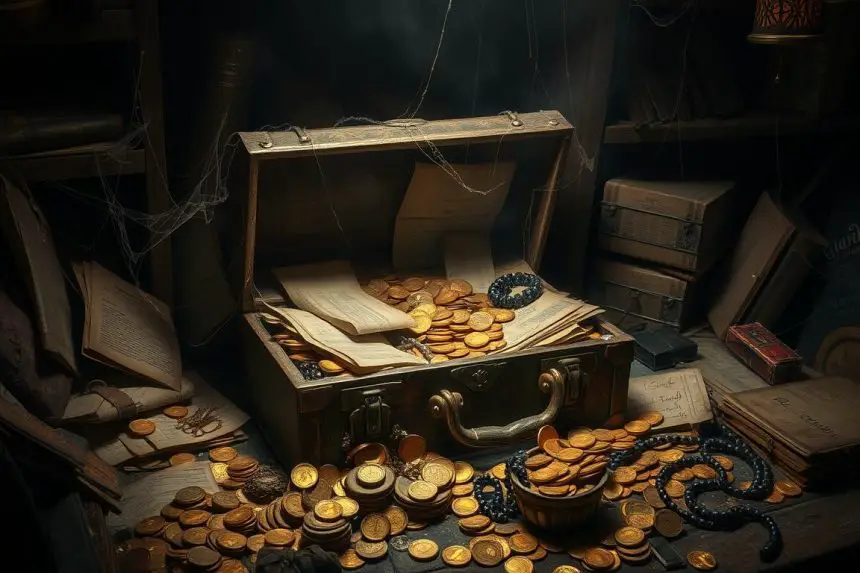Did you know about 1 in 10 Americans might have money or property waiting for them? Every year, people don’t claim about $3 billion in gift cards alone. This shows us that unclaimed cash can come from many places. It could be a bank account you forgot or an insurance policy you didn’t know you had.
In the US, there isn’t just one place to check for lost money. Instead, different agencies keep their own lists. This can make finding your unclaimed funds a bit tricky. But don’t worry! This guide will help you know where to look and how to claim what’s yours. Check out www.unclaimed.org by the National Association of Unclaimed Property Administrators for a free search. Also, watch out for services that want to charge you a fee.
Finding unclaimed money can be a big help, especially if times are tough. You might find money left behind by someone who has passed away, or maybe there’s an old paycheck you never cashed. States usually hold onto this money. So, a little bit of searching could lead you to some unexpected funds.
Key Takeaways
- Approximately 1 in 10 Americans have unclaimed property or money.
- No centralized source exists for unclaimed money or assets at the federal level.
- Various state and federal databases are available online for free unclaimed money search.
- Beware of “locator services” that charge fees to assist in the missing money claim process.
- Unclaimed property can include forgotten bank accounts, insurance policies, unclaimed tax refunds, and more.
What is Unclaimed Money?
Unclaimed money is funds or property left with state governments because the rightful owners lost contact. It can be unclaimed bank accounts, dividends, refunds, or safe deposit box contents. Understanding where these assets come from can help you claim what’s yours.
Definition and Overview
Unclaimed money is money owed to someone that hasn’t been claimed. People lose contact or aren’t aware they have assets. Unclaimed assets include tax refunds, savings accounts, dividends, or stocks. Currently, over $20 billion in unclaimed money awaits its rightful owners in the U.S.
Common Sources of Unclaimed Money
Knowing the sources of unclaimed money can help you find your assets:
- Inactive bank accounts and uncashed checks
- Stock dividends and insurance policy proceeds
- Utility security deposits and rental deposits
- Government refunds, including IRS unclaimed tax refunds
- Matured but unredeemed savings bonds
In 2023, Texas gave back $344 million in unclaimed property, processing around 200,000 claims. A Connecticut resident once claimed $32.8 million in stock proceeds in 2012.
For more on unclaimed property, visit the official website.
Who Can Claim Unclaimed Money?
Not only original owners, but also heirs or legal reps can claim unclaimed money. Claiming requires proof of ownership or identity. In 2023, New York had $18.4 billion in unclaimed funds, with most accounts under $100.
Individuals need current photo ID and address proof to claim. Businesses must present notarized authorization and other documents. Missing inheritances are a common type of unclaimed money, needing legal proof of claim.
One in seven Americans has unclaimed property. This means you might have untapped assets. Sites like MissingMoney.com, endorsed by official organizations, help return these assets.
How to Find and Claim Your Unclaimed Money
Looking for unclaimed money means checking different places, both state and federal. Knowing where and how to look helps you find what belongs to you. This guide will show you the steps to find and get your unclaimed money.
State Treasury Unclaimed Property Offices
Begin your quest at the state treasury unclaimed property offices of places you’ve lived. They handle things like forgotten bank accounts, uncashed checks, stocks, and insurance money. Each state waits a certain time, usually about five years, before considering property unclaimed.
Utilizing Online Databases
Modern tools, especially online databases, help in finding unclaimed cash. Sites like Unclaimed.org by the National Association of Unclaimed Property Administrators, and MissingMoney.com are great to check. These websites make it easier to hunt for money that is waiting for you.

Claiming Unclaimed Money
To claim your money, you need to prove who you are and that you own it. Be ready with documents like ID, Social Security Number, and any paperwork related to the asset. Having all your important documents in order can make things smooth. Claims usually get sorted in about 30 to 90 days.
Federal Agency Unclaimed Funds
Federal agencies also have records of unclaimed funds. For example, the IRS deals with undelivered tax refunds. HUD/FHA looks after mortgage insurance refunds. TreasuryHunt.gov helps you find matured savings bonds that you might not know about. Don’t forget about places like the Department of Labor, which handles unclaimed wages for three years. Make sure to check these sites so you don’t miss out on any money.
Conclusion
There may be unclaimed money out there with your name on it. It could be in dormant accounts or government records. These can include old bank accounts, checks not cashed, and pensions forgotten. To find what’s yours, start a free unclaimed money search.
Each state has its own rules for unclaimed property. This includes the District of Columbia, Guam, Puerto Rico, and the Virgin Islands. They have different times before property is considered dormant, from one to five years. With this guide, you know how to start your unclaimed property search. You can use state treasury offices and online sites. And, you’ll need to fill out the right forms to claim your money.
Billions of dollars are with federal and state governments, just waiting to be claimed. By searching for free unclaimed money, you might find money that belongs to you. It’s yours, so it’s worth checking out. You can start claiming your unclaimed money today. What you find could really help your finances and future.
FAQ
What constitutes unclaimed money?
Unclaimed money is funds or property owed by businesses, banks, or the government that people haven’t picked up. This includes things like forgotten savings accounts, checks never cashed, or tax refunds not claimed.
How can I start an unclaimed property search?
Start your search at your state’s treasury unclaimed property office. They provide online databases to help you search. Good places to look are Unclaimed.org and MissingMoney.com, both reliable sources.
What are common sources of unclaimed money?
You can find unclaimed money in inactive bank accounts, paychecks not cashed, refunds from taxes, unclaimed insurance payouts, stocks, security deposits, and customer overpayments.
Who is eligible to claim unclaimed assets?
People who can show they own or are owed the unclaimed assets can claim. This includes individuals, heirs, beneficiaries, and even businesses that have the right documents.
How do I find lost money through federal agencies?
Look for money through federal agencies’ separate funds. This includes unclaimed tax refunds, FHA mortgage insurance refunds, and bonds not paid. Use Treasury Hunt for U.S. securities and savings bonds that might belong to you.
What proof is needed to claim unclaimed money?
You need documents like personal ID and your Social Security number. Also, bring proof you own or are owed the asset.
How long does the claiming process take?
The time to claim can vary. It depends on the claim’s complexity and the agency’s verification process. This can take a few weeks to months.
Are there any fees involved in claiming unclaimed money?
State searches are usually free. But, be careful; some third-party sites might charge for help. Always verify they are legitimate before you pay.
Can businesses claim unclaimed cash as well?
Yes, businesses can claim funds too. They need the right documentation to prove they’re entitled to the money.
How often should I perform a free unclaimed money search?
It’s smart to search once a year or whenever you think there might be unclaimed money for you. Doing this makes sure you don’t miss out on any funds.




